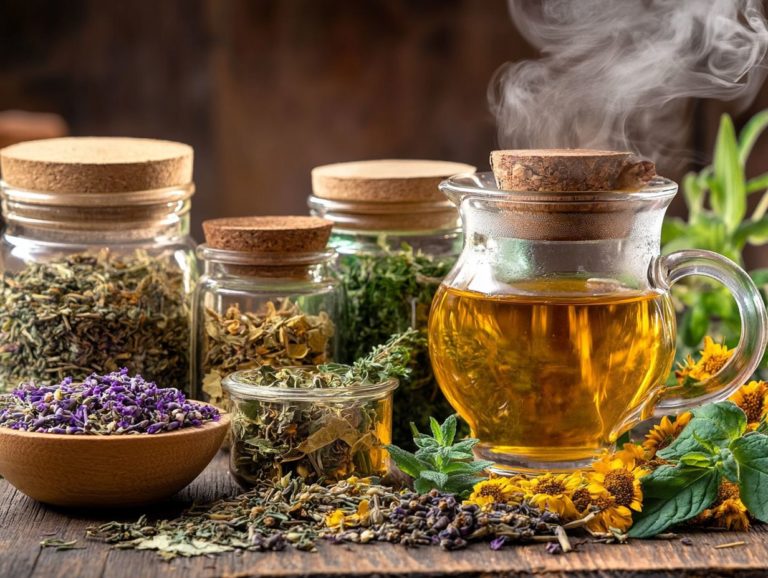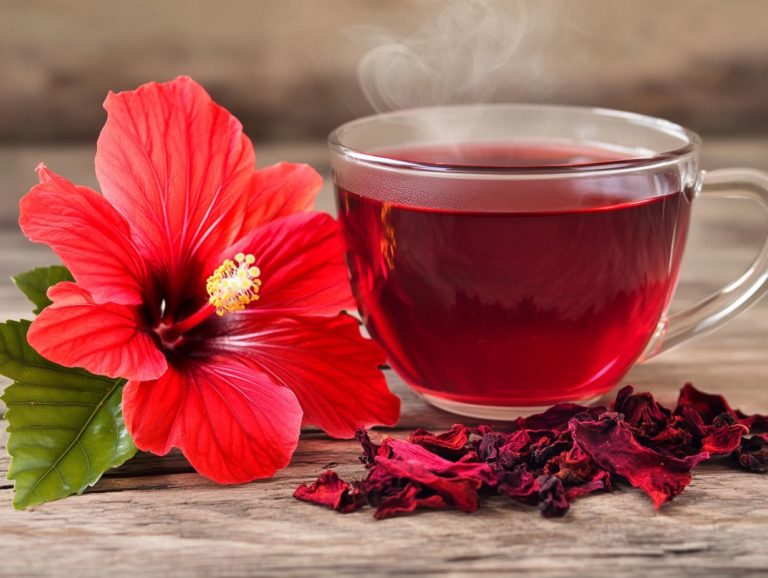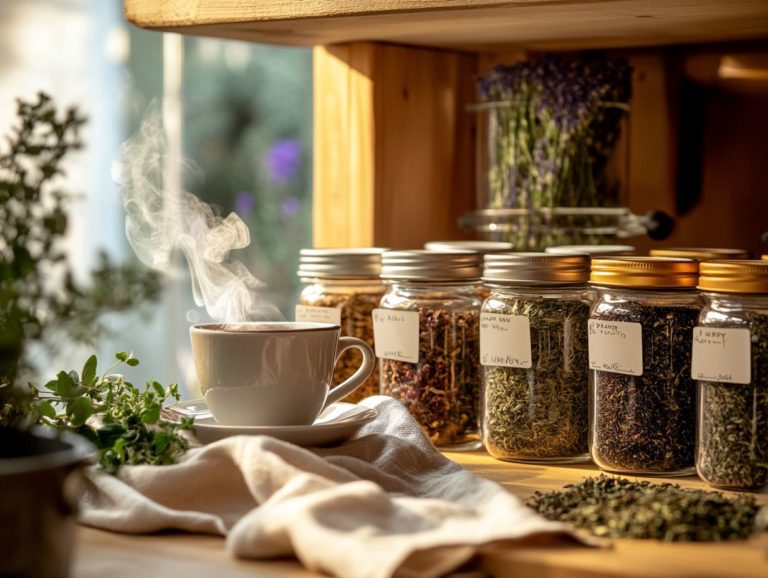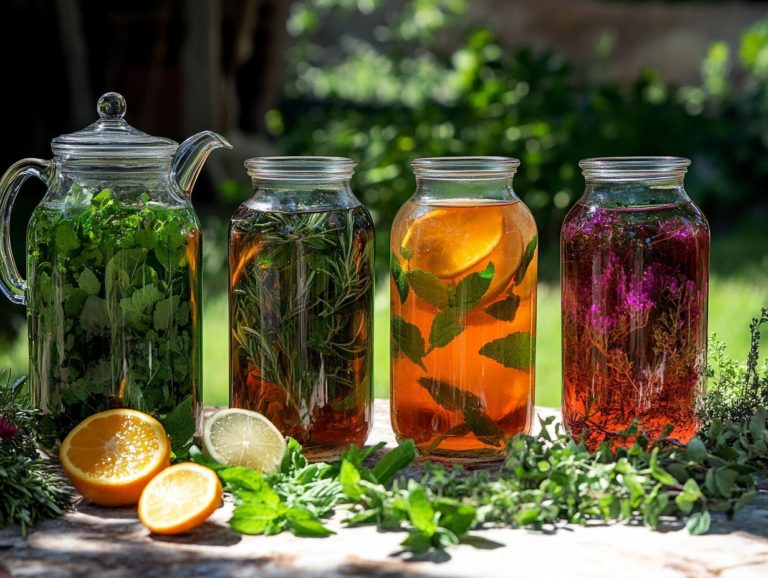Herbal Tea for Heart Health: What to Know
Have you ever wondered how a simple cup of herbal tea can boost your heart health? Dive into the world of herbal tea and discover its remarkable benefits!
Herbal tea has become increasingly popular, not only for its soothing flavors but also for the potential health benefits it offers, especially regarding heart health and supporting the immune system.
This article delves into the essence of herbal tea, focusing on its positive impact on cardiovascular wellness and chronic conditions. Get ready to explore exciting types of herbal tea that can support heart health and gain practical tips on seamlessly incorporating these delightful brews into your diet.
We also address essential considerations, including potential risks and medical advice on selecting high-quality options. Join in as you explore the captivating world of herbal tea and its vital role in fostering a healthier heart.
Contents
- Key Takeaways:
- Understanding Herbal Tea
- Herbal Tea and Heart Health
- How to Incorporate Herbal Tea into Your Diet
- Potential Risks and Considerations
- Frequently Asked Questions
- What is herbal tea and how does it benefit heart health?
- Are all herbal teas equally beneficial for heart health?
- Can herbal teas replace traditional medication for heart health?
- Are there any potential side effects of drinking herbal tea for heart health?
- How often should I drink herbal tea for heart health?
- Are there other lifestyle changes I should make besides drinking herbal tea for heart health?
Key Takeaways:

- Herbal tea is a great option for promoting heart health as it contains powerful antioxidants and anti-inflammatory properties.
- Some herbal teas, such as hibiscus and green tea, have been found to have specific benefits for cardiovascular health and cholesterol management.
- Incorporating herbal tea into your daily routine can be as simple as replacing your usual beverage with a cup of herbal tea or adding it to smoothies or recipes.
Understanding Herbal Tea
Understanding herbal tea invites you to explore its diverse types and health-promoting properties. It offers extensive benefits, including cancer prevention.
Unlike traditional teas such as green or black tea, herbal teas are crafted from a variety of plant leaves, flowers, and roots. This offers a rich spectrum of antioxidants and plant compounds called polyphenols that can help protect your cells from damage. Additionally, certain herbal teas for stress relief can further enhance your well-being.
Research has underscored their potential health benefits, particularly in reducing inflammation, enhancing digestive health, and improving sleep quality. This has made herbal teas a favored choice for those seeking dietary supplements to support overall wellness, as noted by reputable organizations like the American Heart Association and the Academy of Nutrition and Dietetics. For instance, 5 herbal teas for better skin health can be a great addition to your regimen.
What is Herbal Tea?
Herbal tea is a delightful beverage crafted by infusing an array of plant materials think leaves, flowers, and roots into hot water. This results in a flavorful and often caffeine-free drink that tantalizes the senses.
This enchanting concoction has its origins in ancient traditions, where herbal infusions were cherished not only for their pleasure but also for their medicinal properties. Unlike traditional teas such as green and black tea, which come from the Camellia sinensis plant and contain varying levels of caffeine, herbal tea spans a diverse range of plants, each presenting its own unique health benefits.
Take chamomile tea, for instance; it’s renowned for its calming effects, while ginseng tea struts in with its energy-boosting prowess. Other popular choices include rooibos tea, celebrated for its rich, sweet flavor and antioxidant properties. Embracing these options can lead to a variety of benefits, as detailed in our article on herbal tea: benefits of drinking it daily. Although they hail from the same tea plant, their preparation methods and health-enhancing qualities are significantly different, offering a world of flavor and wellness for your exploration.
Herbal Tea and Heart Health
Herbal tea plays a crucial role in enhancing heart health. Numerous clinical studies reveal its impressive potential to reduce the risk of cardiovascular diseases. The American Heart Association highlights how herbal tea can modulate cholesterol levels and blood pressure, supporting overall heart conditions and making it a valuable addition to your wellness routine.
The antioxidants, polyphenols, and flavonoids found in various herbal teas are celebrated for their heart-protective properties. These contribute to improved cardiovascular function, support against chronic conditions, and a reduction in inflammation. For those seeking natural remedies, herbal tea for anxiety relief could be a simple yet effective step toward nurturing your heart’s well-being.
Benefits for Cardiovascular Health

The benefits of herbal tea for your cardiovascular health are remarkable. Regular consumption can help improve heart conditions thanks to the antioxidants, polyphenols, flavonoids, and anti-inflammatory effects found in herbal remedies.
Research shows that certain herbal teas, like hibiscus and green tea, can significantly lower blood pressure and enhance heart function while also benefiting your mind. Hibiscus tea has been shown to lower both systolic and diastolic blood pressure in clinical trials. Meanwhile, the catechin content in green tea is linked to better endothelial function and lower cholesterol levels. To learn more about the origins of these beneficial brews, check out the history of herbal tea.
These findings highlight the importance of incorporating herbal remedies into your heart-healthy lifestyle. They aren t just tasty; they also provide a natural way to support cardiovascular well-being while you enjoy a soothing beverage.
Types of Herbal Tea for Heart Health
Various herbal teas offer unique benefits for your cardiovascular function and overall heart health. Consider chamomile, ginseng, rooibos, oolong, and white tea.
Chamomile tea is renowned for its calming properties and can help reduce stress levels, which is crucial for heart health. Ginseng has been linked to better circulation and lower blood pressure, both excellent for your heart. Additionally, using herbal solutions for cardiovascular health, like rooibos tea, naturally caffeine-free, is packed with antioxidants that may protect your heart from damage.
Oolong tea combines the benefits of green and black tea, potentially lowering cholesterol levels, while white tea shines with its high catechin content, known to support the cardiovascular system.
Before adding these herbal varieties to your diet, consult a healthcare provider to ensure they align with your health needs.
How to Incorporate Herbal Tea into Your Diet
Integrating herbal tea into your diet is an easy way to enjoy its health benefits while supporting your overall wellness and reducing sugar intake.
With various brewing methods, you can tailor your tea experience. As research shows the advantages of regular tea consumption, making herbal tea a part of your lifestyle has never been easier.
Ways to Prepare and Enjoy
There are countless ways to prepare and enjoy herbal tea. You can choose between steeping loose tea leaves or using tea bags, depending on your preference for convenience or a more artisanal approach.
The ideal steeping temperature is around 200 F, and the steeping time can range from 5 to 15 minutes, depending on the herbal blend you choose.
To enhance your tea experience, consider adding natural flavorings like honey, lemon, or fresh mint. These additions enhance the aroma and complement your meals. Herbal tea pairs wonderfully with light salads or spicy dishes, making it a versatile choice. For those interested in the health benefits, explore the science behind herbal tea benefits.
Potential Risks and Considerations

While herbal tea offers many health benefits, it s crucial to be aware of potential risks and considerations, especially regarding side effects and interactions with medications.
Consult resources like the American Heart Association to feel empowered in selecting safe, high-quality herbal tea options that align with your wellness goals.
Which herbal tea will you try first to boost your heart health?
Side Effects and Interactions with Medications
Side effects and interactions with medications are crucial considerations when indulging in herbal tea. Certain ingredients can significantly influence your health outcomes.
For example, if you re sipping on herbal infusions that contain St. John’s Wort, be aware that it can alter the metabolism of various medications. This may reduce their effectiveness or amplify side effects, particularly with medications that help prevent blood clots and other prescriptions.
Ingredients like ginseng and garlic can complicate matters when paired with anticoagulants, increasing your risk of bleeding.
It s crucial to realize that herbal blends, often viewed as benign, can still pose safety risks. This is especially true if you re already taking prescription medications that may interact with these herbal teas.
If you want to add herbal tea to your daily routine, consulting a healthcare professional is wise. This way, you can navigate any potential interactions and ensure your overall health remains a top priority.
Choosing Safe and High-Quality Herbal Tea
Choosing safe and high-quality herbal tea is vital for maximizing its health benefits while minimizing the risks linked to inferior products. It also ensures compliance with your dietary goals.
Seek out brands that prioritize transparency in their sourcing. They should provide detailed ingredient lists and adhere to rigorous testing protocols that confirm their commitment to quality, as endorsed by reputable organizations like the American Heart Association.
Check for certifications and lab testing to confirm that products are free from contaminants. Opting for organic options can further mitigate your exposure to pesticides and harmful chemicals.
Exploring diverse blends can enhance your overall wellness. These blends should be rich in antioxidants and other beneficial compounds.
By keeping these criteria in mind during your selection process, you not only elevate your drinking experience but also foster a healthier lifestyle. This can positively impact your cardiovascular health.
Frequently Asked Questions
What is herbal tea and how does it benefit heart health?

Herbal tea is a beverage made from steeping various herbs, spices, and plants in hot water. Some popular herbs used for heart health include hawthorn, ginger, and turmeric, which have been shown to improve heart function and lower blood pressure.
Are all herbal teas equally beneficial for heart health?
No, not all herbal teas have the same impact on heart health. It is important to choose teas that specifically target heart health, such as those containing hawthorn or ginger.
Always check with a healthcare provider before incorporating herbal teas into your diet.
Can herbal teas replace traditional medication for heart health?
No, herbal teas should not be used as a replacement for traditional medication for heart health. While they can provide supportive benefits, they should be used alongside prescribed medication and under the guidance of a healthcare professional.
Are there any potential side effects of drinking herbal tea for heart health?
Some herbal teas may have potential side effects, especially if consumed in large quantities. For example, hawthorn may interact with certain medications, and excessive consumption of ginger tea may cause stomach upset.
It’s important to consult with a healthcare provider before incorporating herbal teas into your routine.
How often should I drink herbal tea for heart health?
The frequency of herbal tea consumption for heart health may vary depending on the individual and the specific type of tea being consumed, whether it be green tea, black tea, or rooibos tea.
Generally, it’s recommended to limit consumption to 2-3 cups per day and consult with a healthcare provider for personalized recommendations.
Ready to sip your way to better health? Start exploring our herbal tea recommendations today!
Are there other lifestyle changes I should make besides drinking herbal tea for heart health?
Herbal tea is a great start for promoting heart health. However, it shouldn t be the only thing you rely on.
Incorporate a balanced diet filled with fruits and vegetables. Regular exercise and stress management techniques are also vital for your heart.
Making these changes can significantly improve your overall well-being and help manage inflammation. Start today for a healthier heart!






